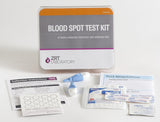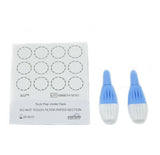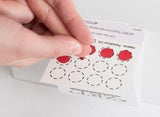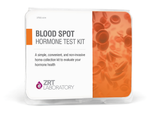The Testosterone (T) Test is specifically designed to accurately evaluate the levels of testosterone hormone in the bloodstream and determine if they fall within the reference range. The testosterone blood spot testing kit is carefully crafted to measure testosterone levels with precision, enabling the identification of potential health conditions associated with the symptoms mentioned below. If you suspect that your testosterone levels are low, it is highly recommended to undergo this test for a comprehensive assessment.
Key Features of the Testosterone Test:
- Test Result: Upon submitting your sample to the laboratory, you can expect to receive your test result within 3-5 working days. The result will provide a comprehensive assessment of your hormone levels, presented in both graphical and numerical formats. Additionally, you will find detailed comments from a Hormone Specialist PhD Dr, who will analyze your hormone levels and provide recommendations for further actions based on the results.
- The convenience of Home Sample Collection: The test allows you to collect your samples comfortably from your own home. This eliminates the need for visiting a medical facility or clinic, providing convenience and privacy during the testing process.
- Suitable for All Genders and Ages: The testosterone test is suitable for both adults and children, males and females. Regardless of age, individuals can utilize this test to assess their testosterone levels and gain insights into their hormonal health.
- Shelf Life: The test kit should be used within 12 months from the date of purchase. It is important to adhere to this timeframe to ensure the accuracy and validity of the test results.
- Inclusive Laboratory Fee: The test kit includes a laboratory fee, meaning that you won't encounter any additional costs or taxes for the testing process. The fee covers the comprehensive analysis of your hormone levels, providing value for your investment.
- Customer Responsibility for Shipping: While the test kit covers the laboratory fee, customers are responsible for shipping their collected samples to the laboratory. Clear instructions will be provided to guide you on the proper packaging and shipping of your sample, ensuring its safe arrival for analysis.
- The freshness of the dried blood spot sample is crucial for accurate hormone level analysis. When using our test kit, you can be assured that your sample will remain fresh for up to 45 days. The shipping time from your location to our laboratory plays a significant role in maintaining sample freshness. If you choose to utilize the post office service, it typically takes between 3 to 5 working days for your sample to reach our lab. Alternatively, if you opt for private carriers, the delivery time can be expedited to within 48 hours. This ensures that your sample arrives promptly, preserving its freshness and integrity for precise hormone-level testing.
By highlighting these key features, the testosterone test offers an accessible and convenient solution for individuals of all ages to assess their testosterone hormone levels, receive accurate results, and obtain expert analysis and recommendations from a Hormone Specialist PhD.
Test Kit Includes Following Components:
The test kit comprises several essential components to facilitate the sample collection and return process. These components are carefully included to ensure a smooth and accurate testing experience. The test kit includes:
- Sample collection card: This card is specifically designed for the collection of the required sample. It is sterile and suitable for preserving the integrity of the sample during transportation.
- Two lancets: The kit includes two lancets, which are small, sterile instruments used to puncture the skin safely and effectively for blood collection. These lancets are designed to minimize discomfort during the collection process.
- Sample collection instructions: Clear and detailed instructions are provided to guide users through the process of collecting the sample accurately. These instructions ensure that the collection is performed correctly and in accordance with the testing requirements.
- Test requisition form: This form contains important information that needs to be filled out by the user. It typically includes personal details, such as name and contact information, a list of symptoms as well as any additional information required for testing purposes.
- Return envelope: A pre-addressed return envelope is included in the kit. It is specifically provided for the convenient and secure return of the collected sample to the testing facility. Users can simply seal the envelope with the sample inside and mail it back following the provided instructions.
- Shipping Instructions: The kit also includes detailed instructions on how to properly package and ship the collected sample back to the testing facility. These instructions ensure that the sample remains protected and arrives safely for analysis.
By including these components in the test kit, the aim is to streamline the sample collection and return process, allowing users to perform the test easily and efficiently while maintaining the integrity of the sample.
The Benefit of Testosterone Hormone Test
Monitoring testosterone levels through regular testosterone testing can provide several benefits for overall health and wellness. Here are the key advantages of testosterone test monitoring:
- Early Detection of Hormonal Imbalances: Testosterone testing allows for the early detection of hormonal imbalances, including both low and high testosterone levels. This early identification enables prompt intervention and treatment if necessary, preventing potential complications and improving overall health outcomes.
- Assessment of Hormonal Health: Testosterone plays a critical role in various aspects of health, including sexual function, reproductive health, muscle mass, bone density, mood regulation, and energy levels. Monitoring testosterone levels helps assess the adequacy of hormone production and its impact on these areas, providing insights into overall hormonal health.
- Identification of Underlying Health Issues: Abnormal testosterone levels can be indicative of underlying health conditions or diseases. Low testosterone levels may be associated with conditions such as hypogonadism, metabolic disorders, or chronic illnesses. Conversely, excessively high testosterone levels can be linked to conditions like polycystic ovary syndrome (PCOS) or certain tumours. Monitoring testosterone levels can help identify these underlying issues and facilitate appropriate medical interventions.
- Optimization of Treatment Plans: For individuals undergoing testosterone replacement therapy (TRT) or other hormone-related treatments, regular testosterone monitoring is crucial. It allows healthcare providers to assess the effectiveness of the treatment and make necessary adjustments to optimize hormonal balance. This ensures that individuals receive the appropriate dosage and achieve the desired therapeutic outcomes.
- Sexual and Reproductive Health Management: Testosterone is closely associated with sexual function, libido, and fertility. Monitoring testosterone levels can help evaluate any potential impact on sexual health and guide appropriate interventions. For couples trying to conceive, assessing testosterone levels in males can provide insights into fertility issues and aid in planning suitable treatment strategies.
- Muscle Strength and Bone Health: Testosterone is a key hormone involved in maintaining muscle mass, strength, and bone density. Monitoring testosterone levels helps track changes in these parameters and may inform lifestyle modifications, exercise programs, or medical interventions aimed at optimizing muscle function and bone health.
- Emotional Well-being and Quality of Life: Testosterone influences mood, energy levels, and overall sense of well-being. Monitoring testosterone levels can help assess any correlation between hormonal fluctuations and emotional well-being, such as symptoms of depression, fatigue, or decreased motivation. Appropriate management of testosterone levels can positively impact mood and enhance overall quality of life.
- Personalized Health Management: Testosterone testing provides personalized insights into an individual's hormonal profile, allowing for targeted health management. It enables healthcare professionals to tailor interventions, lifestyle modifications, or treatment plans based on an individual's specific testosterone levels, optimizing health outcomes and well-being.
In summary, monitoring testosterone levels supports early detection of hormonal imbalances, identification of underlying health issues, optimization of treatment plans, and management of sexual, reproductive, muscular, and emotional well-being. Regular testosterone testing contributes to a comprehensive approach to health monitoring and empowers individuals to manage their overall health and wellness proactively.
Testosterone Deficiency Symptoms
Testosterone deficiency, or low testosterone levels, can impact both men and women. It manifests through various symptoms, which include:
- Decreased libido: A decline in sexual desire or a decrease in the frequency and intensity of sexual thoughts and fantasies.
- Sexual dysfunction: Difficulties in achieving or maintaining erections in men (erectile dysfunction) and difficulties with arousal, lubrication, or orgasm in women.
- Reduced sexual desire: A diminished interest or motivation for sexual activity.
- Infertility: Testosterone plays a crucial role in sperm production, and low levels can contribute to infertility issues in men.
- Decrease in muscle mass: Testosterone is responsible for promoting muscle growth and maintenance. When levels are low, individuals may experience a decrease in muscle mass or struggle to build and maintain distinctive muscles.
- Fat deposits in the stomach and breast areas: Testosterone helps regulate fat distribution in the body. Low levels can lead to an accumulation of fat in the abdominal and breast areas.
- Cellulite: Reduced testosterone levels can contribute to the development of cellulite, resulting in a dimpled appearance of the skin, particularly in areas such as the thighs and buttocks.
- Varicose veins: Testosterone deficiency may affect vein health, leading to the development of enlarged and twisted veins, commonly known as varicose veins.
- Slack arms and face: Low testosterone levels can contribute to a loss of muscle tone and firmness, resulting in sagging or slackness in the arms and facial areas.
- Wrinkle development: Testosterone plays a role in maintaining skin health and elasticity. Insufficient levels can contribute to the development of wrinkles and fine lines on the face and body.
- Insomnia/sleep disturbance: Testosterone deficiency can disrupt sleep patterns, leading to difficulties falling asleep, staying asleep, or experiencing poor sleep quality.
- Worsening sleep apnea: Sleep apnea is a sleep disorder characterized by pauses in breathing during sleep. Low testosterone levels can exacerbate the severity of sleep apnea symptoms.
- Depression: Testosterone plays a role in regulating mood, and a deficiency can contribute to feelings of depression, sadness, or low mood.
- Decreased motivation: Low testosterone levels can result in reduced motivation, drive, and energy levels, affecting both physical and mental performance.
By utilizing our Blood Spot Hormone Testing kit, you can measure your testosterone levels and ascertain whether they are within the optimal range. The results will provide valuable information about whether your testosterone levels are too high or too low based on the reference range specific to your gender and age group. This comprehensive analysis aids in understanding your hormonal status and guides appropriate interventions or treatments if necessary.
What causes testosterone deficiency?
Testosterone deficiency can have various causes, including congenital factors or being triggered by accidents or illnesses. However, one of the most common causes is the natural deterioration of hormone production that occurs with age, including testosterone.
Several factors can exacerbate testosterone deficiency, such as intense physical activity or high emotional stress. Additionally, diet plays a role, as certain foods can lower testosterone levels (such as sugar and whole grain products), while others can increase testosterone production (such as foods rich in saturated fats, including protein-rich foods like meat, fish, and leguminous plants).
It is important to note that many of the symptoms associated with testosterone deficiency can have other underlying causes. In cases of mild testosterone deficiency, adopting a proper diet may help alleviate symptoms. However, if the deficiency is more severe, restoring the natural hormonal balance may require medical treatment, such as the purposeful consumption of bioidentical hormones under the supervision of a healthcare professional.
How does the test carry out?
The testosterone test utilizes a blood spot-based testing method, which allows you to perform the test conveniently and privately in your own home. The process involves collecting a small blood spot from your fingertip using a lancet provided in the test kit. Once you have obtained the blood sample, you will seal it securely and send it to our laboratory for analysis.
After the laboratory receives your sample, your test result report will be generated and emailed to you within 3 to 5 working days. The report will provide a comprehensive analysis of your testosterone levels, helping you understand whether they are within the reference range. This allows for a timely assessment of your hormonal status and facilitates appropriate steps for further evaluation or treatment, if necessary.
Further Reading
What is Testosterone?
Testosterone is a steroid hormone that belongs to the androgen group, primarily produced in the testes in males and in smaller amounts in the ovaries and adrenal glands in females. It plays a crucial role in the development and maintenance of male sexual characteristics and reproductive functions. In males, testosterone is responsible for the growth and maturation of the male reproductive organs during puberty, including the penis, testes, and prostate. It also stimulates the development of secondary sexual characteristics such as deepening of the voice, growth of facial and body hair, and increased muscle mass and strength.
Testosterone is not exclusive to males, as females also produce and require it, although in much lower amounts. In women, testosterone contributes to maintaining bone density, muscle mass, and sex drive. It also plays a role in overall well-being and mood regulation in both genders.
Beyond its effects on reproductive health, testosterone has systemic effects on various bodily functions. It impacts metabolism, influencing fat distribution and muscle development. It also affects red blood cell production, bone density, and cognitive functions such as memory and spatial abilities. Furthermore, testosterone plays a role in mood regulation, energy levels, and overall sense of vitality.
The production of testosterone is regulated by a complex feedback loop involving the hypothalamus and the pituitary gland in the brain. The hypothalamus secretes a hormone called gonadotropin-releasing hormone (GnRH), which stimulates the pituitary gland to release luteinizing hormone (LH) and follicle-stimulating hormone (FSH). LH then signals the testes (in males) or ovaries (in females) to produce testosterone.
The levels of testosterone in the body can fluctuate throughout the day, with the highest levels typically occurring in the morning. It is important to maintain testosterone levels within a healthy range, as both deficiency and excess can lead to various health issues. Testosterone deficiency can result in symptoms such as decreased sex drive, fatigue, decreased muscle mass, mood changes, and fertility problems. On the other hand, abnormally high levels of testosterone may cause acne, excessive hair growth, aggression, and menstrual irregularities in women.
Assessing testosterone levels through diagnostic tests helps evaluate hormonal health and diagnose any imbalances or deficiencies that may require further investigation or treatment.
What is the function of Testosterone?
Testosterone serves numerous essential functions in the body, playing a pivotal role in various physiological processes. Some of the primary functions of testosterone include:
- Sexual Development and Reproduction: Testosterone is crucial for the development of male sexual characteristics during puberty. It stimulates the growth and maturation of the male reproductive organs, including the penis, testes, and prostate. It also contributes to the production of sperm and supports fertility.
- Regulation of Libido and Sexual Function: Testosterone plays a key role in sexual desire (libido) and the maintenance of healthy sexual function in both males and females. It influences sexual arousal, erectile function in men, and overall sexual satisfaction.
- Muscle Mass and Strength: Testosterone is an anabolic hormone that promotes muscle growth and maintenance. It stimulates protein synthesis and increases muscle mass, strength, and endurance. This is why testosterone is often associated with athletic performance and bodybuilding.
- Bone Health: Testosterone plays a crucial role in maintaining bone density and strength. It promotes the production of new bone cells and helps prevent age-related bone loss, reducing the risk of osteoporosis and fractures.
- Fat Distribution and Metabolism: Testosterone affects fat metabolism and distribution in the body. It helps regulate the balance between lean muscle mass and fat mass. Adequate testosterone levels support a healthier body composition by reducing fat accumulation and preserving muscle mass.
- Red Blood Cell Production: Testosterone stimulates the production of red blood cells in the bone marrow. Red blood cells carry oxygen throughout the body, ensuring proper oxygenation of tissues and organs.
- Mood Regulation and Mental Health: Testosterone influences mood, energy levels, and overall well-being. Low testosterone levels have been associated with symptoms of depression, fatigue, irritability, and reduced motivation. Maintaining optimal testosterone levels can contribute to improved mood and mental health.
- Cognitive Function: Testosterone has an impact on cognitive abilities, including memory, attention, spatial awareness, and problem-solving skills. Adequate testosterone levels support optimal brain function and may help maintain cognitive health as individuals age.
- Cardiovascular Health: Testosterone plays a role in maintaining cardiovascular health. It helps regulate blood pressure, cholesterol levels, and blood vessel dilation, reducing the risk of cardiovascular diseases.
- Overall Vitality and Well-being: Testosterone contributes to a sense of vitality, energy, and general well-being in both men and women. It influences motivation, confidence, and quality of life.
It's important to note that testosterone levels naturally decline with age. However, significant deficiencies or imbalances can have adverse effects on various bodily functions. Monitoring testosterone levels and addressing any deficiencies or abnormalities through medical interventions, when necessary, can help optimize overall health and well-being.
How to Use












